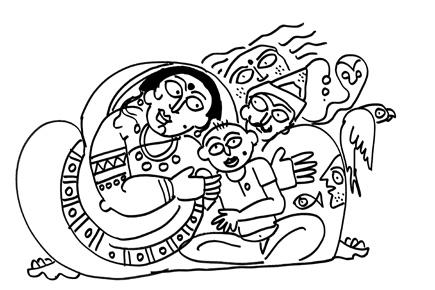Emotional blackmail perhaps began with Kaikeyi who used it to get her way with Dasharatha in the Ramayana.

 Emotional blackmail perhaps began with Kaikeyi who used it to get her way with Dasharatha in the Ramayana. Or maybe Duryodhana who used emotional blackmail to manipulate Karna in the Mahabharata. Even perhaps Krishna when he told Arjuna, “If you love me, then pick up your bow and fight your enemy.”
Emotional blackmail perhaps began with Kaikeyi who used it to get her way with Dasharatha in the Ramayana. Or maybe Duryodhana who used emotional blackmail to manipulate Karna in the Mahabharata. Even perhaps Krishna when he told Arjuna, “If you love me, then pick up your bow and fight your enemy.”

Illustration/Devdutt Pattanaik
ADVERTISEMENT
Naturally, it has made its way to Indian families. The mother says, “If you love me, you will finish all the food on the plate.” Then the father says, “If you love me, you will study hard.” Then the aunt says, “If you love me, you will not marry the girl you chose.” Then the uncle says, “If you love me, you will marry the girl we chose.” Lovers often say to each other, “If you love me, then you will give up your job/religion/family/life.”
Religions have for long used this strategy. Evangelists go around saying, “If you love the Lord, you will hate homosexuals and those who support abortions.” Religious sects say, “If you love the guru, you will make that donation regularly.” Political parties tell voters, “If you care for the minorities/Hindus/Dalits/social justice, you will vote for us.”
So it had to happen. “If you care for your country, you have to watch a television show.” The ultimate measure of patriotism driven by consumption economics!
Animals do not emotionally blackmail, though some dog lovers reluctantly admit being controlled by the weepy whines of their pets. Humans set themselves up for emotional blackmail. It is rooted in the human desire to be validated by those around us. We may be rich/honest/brave/patriotic but we need someone else to validate it. And people take advantage of this yearning for validation. They turn into judges and define evaluation measures that usually benefit them. As long as we grant such people the power to judge us, we remain at the receiving end.
But then one day the child grows up. Refuses to eat the food the mother forces him to eat, or marry the girl the family chooses for him, or take up a career that meets with family approval. Rather than submit to family pressures, he follows his own heart. He is accused of being the unfaithful son, the home-wrecker, even the evil one. But he does not succumb. He does not need their judgement to validate himself. He makes his own path, knowing fully well that he loves his parents even if they are manipulative control freaks, even if they are unable to love him for not being their perfect obedient child.
Emotional blackmailers despite their avowed declaration of noble intentions (“I am doing it for you own good”) are usually self-absorbed. They fail to understand the other. They never ask, “Why is he not doing what I feel is good for him?” If they did, they would understand something more about the human condition, and about themselves. There will be a bit more affection and empathy for the failings of humankind, and less smug sanctimony.
The author is Chief Belief Officer of the Future Group, and can be reached at devdutt@devdutt.com
The views expressed in this column are the individual’s and don’t represent those of the paper.
 Subscribe today by clicking the link and stay updated with the latest news!" Click here!
Subscribe today by clicking the link and stay updated with the latest news!" Click here!







